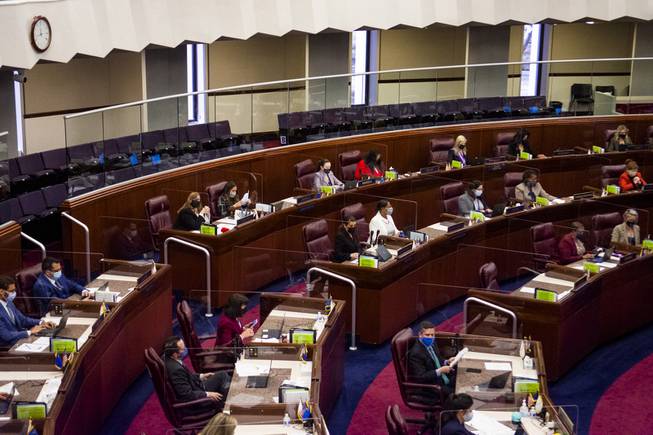
David Calvert/The Nevada Independent, Pool
Members of the Assembly during the floor session inside the Legislature on Tuesday, March 9, 2021 in Carson City. State Sen. Robin Titus, R-Wellington, is suing Nevada officials challenging the constitutionality of the public option health care plan set to go into effect in 2026.
Wednesday, Jan. 3, 2024 | 3:45 p.m.
A Nevada state senator and the National Taxpayers Union have filed a lawsuit challenging the constitutionality of a 2021 state law that established a public option health care plan scheduled to launch in 2026.
The lawsuit, filed Tuesday in Nevada’s First Judicial District Court in Carson City, charges that Senate Bill 420, passed into law during the 2021 legislative session, violates three provisions in the Nevada Constitution.
State Sen. Robin Titus, R-Wellington, who is a practicing doctor, said in a news release from the NTU the bill would worsen an existing shortage of medical professionals in the state and in turn cause negative health outcomes for Nevadans. The NTU describes itself on its website as a fiscal advocacy group that endorses “lean and efficient government services and regulations” and sustainable fiscal policies.
“I opposed SB 420 as a member of the Nevada Assembly because creating a state government-controlled 'Public Option' will worsen our state’s already severe shortage of doctors and nurses, harm Nevadans’ access to quality health care and drive costs even higher,” Titus, a former assemblywoman, said in the release. Public option is a health insurance program hosted by the government on either the state or federal level. It can be operated through a private insurance company.
“In addition to the negative consequences this law will have for Nevadans’ health care," Titus continued, "it was enacted in clear violation of our state’s constitution. I am proud to bring forward this legal action to protect Nevadans and I urge the court to recognize the unconstitutional nature of SB 420 and to stop its implementation accordingly.”
The lawsuit asserts the bill needed a two-thirds majority of both the Nevada Assembly and state Senate to pass, a higher threshold than the party-line margins that sent the legislation to then-Gov. Steve Sisolak. The lawsuit also charges that language in the bill allowing the state treasurer and Department of Health and Human Services director “nearly unlimited discretion” on a continuous basis without authorization from the Legislature.
Further, the lawsuit states SB 420 violates the separation-of-powers principle because it “impermissibly delegates” lawmaking authority to executive branch agency directors “without providing any suitable standard to govern the manner and circumstances under which that authority is exercised.”
“Not only is the substance of SB 420 harmful to Nevada taxpayers, it violates the Nevada Constitution in several ways,” Joe Bishop‐Henchman, executive vice president of the National Taxpayers Union Foundation, said in the release. “We urge the court to weigh the facts, which demonstrate clearly that SB 420 is unconstitutional, and to stop the state from taking any further action to implement, enforce or execute this law.”
Democrats controlled both chambers of the legislature and approved SB 420 on a 26-15 party line vote in the Assembly and a 12-9 margin in the Senate. The bill was signed into law by Sisolak that June, amid projections it could lower insurance premium costs for Nevadans by as much as 15% by 2025.
The lawsuit names current Gov. Joe Lombardo, a Republican, as one of the defendants. But in his inaugural State of the State Address last year, the governor called on lawmakers to repeal the public option, and at a candidate forum in April 2022, used a profanity in describing the program.
Other defendants are State Treasurer Zach Conine, Nevada Department of Health and Human Services director Richard Whitley, Nevada Commissioner of Insurance Scott Kipper and Russell Cook, executive director of the Silver State Health Insurance Exchange.
